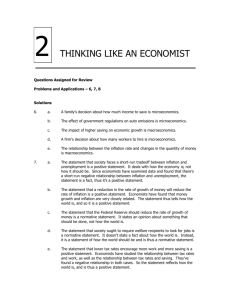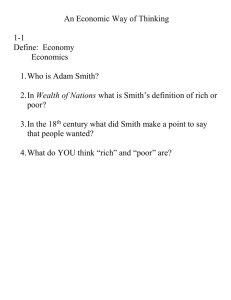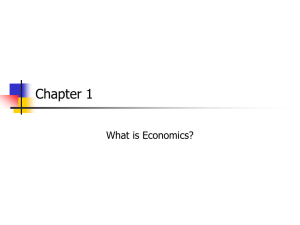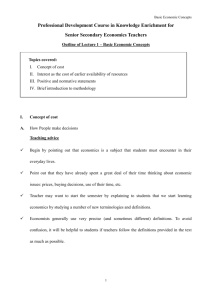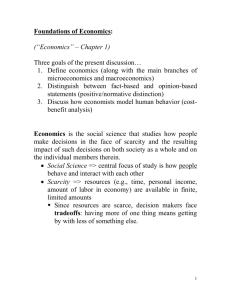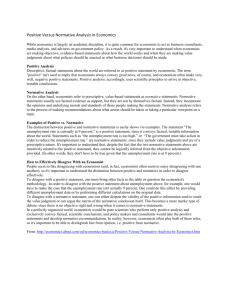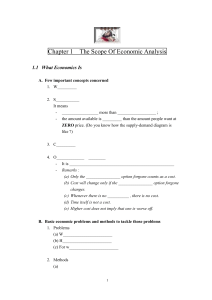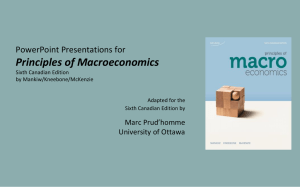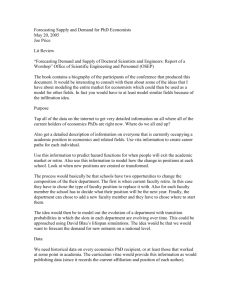THE NATURE OF ECONOMIC ANALYSIS
advertisement
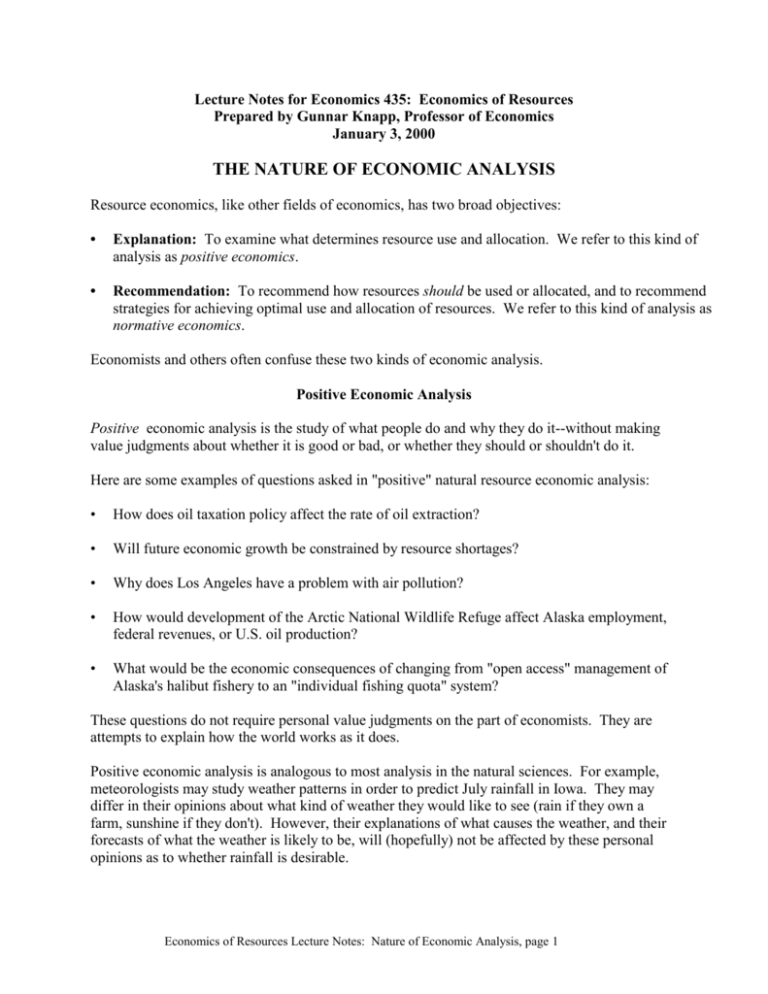
Lecture Notes for Economics 435: Economics of Resources Prepared by Gunnar Knapp, Professor of Economics January 3, 2000 THE NATURE OF ECONOMIC ANALYSIS Resource economics, like other fields of economics, has two broad objectives: • Explanation: To examine what determines resource use and allocation. We refer to this kind of analysis as positive economics. • Recommendation: To recommend how resources should be used or allocated, and to recommend strategies for achieving optimal use and allocation of resources. We refer to this kind of analysis as normative economics. Economists and others often confuse these two kinds of economic analysis. Positive Economic Analysis Positive economic analysis is the study of what people do and why they do it--without making value judgments about whether it is good or bad, or whether they should or shouldn't do it. Here are some examples of questions asked in "positive" natural resource economic analysis: • How does oil taxation policy affect the rate of oil extraction? • Will future economic growth be constrained by resource shortages? • Why does Los Angeles have a problem with air pollution? • How would development of the Arctic National Wildlife Refuge affect Alaska employment, federal revenues, or U.S. oil production? • What would be the economic consequences of changing from "open access" management of Alaska's halibut fishery to an "individual fishing quota" system? These questions do not require personal value judgments on the part of economists. They are attempts to explain how the world works as it does. Positive economic analysis is analogous to most analysis in the natural sciences. For example, meteorologists may study weather patterns in order to predict July rainfall in Iowa. They may differ in their opinions about what kind of weather they would like to see (rain if they own a farm, sunshine if they don't). However, their explanations of what causes the weather, and their forecasts of what the weather is likely to be, will (hopefully) not be affected by these personal opinions as to whether rainfall is desirable. Economics of Resources Lecture Notes: Nature of Economic Analysis, page 1 Of course, they may still differ in their explanations and forecasts of the weather. But these explanations differ as a result of differences in scientific approach, rather than personal or political preferences relating to weather. Depending on the extent of their disagreements, and their overall success in explaining and predicting the weather, they may or may not enjoy the confidence and respect of the general public. Economists' projections of future oil prices may differ for a variety of reasons: because they have different opinions about how oil markets work, because they have different opinions about what is likely to happen in Middle East politics, or because they have different opinions about how much gasoline Americans are likely to want to use for their cars. But generally, their predictions are unlikely to be affected by whether or not they want future oil prices to be higher or lower. Normative Economic Analysis Normative economic analysis is the study of what should be done in order to achieve a particular goal. Examples of normative resource economics questions include: • What oil taxation strategy would be best for the State of Alaska? • Should we change our goals for economic growth because of possible future resource shortages? • How should Los Angeles deal with its air pollution problem? • Should the Arctic National Wildlife Refuge be opened for oil exploration and development? • Should an "individual fishing quota" management system be adopted for the Alaska halibut fishery? You can't address these questions without understanding how the economic system works. In other words, you can't answer a normative economic question without positive economic analysis. But in addition, a normative economic question cannot be answered without first defining a goal that you are trying to achieve. As will be discussed in the next lecture, in public policy questions, different people may have different goals, such as economic efficiency, equity, regional economic impact, or environmental protection. Which of these goals you consider important is a matter of personal value judgement. Economists have no basis for claiming that their own personal values--or their own personal views as to the proper objectives for public policies--are necessarily superior to anyone elses. We need economics to address normative economic questions. But before we accept an economist's normative analysis of an issue, we must make sure that the economist's value judgements about the goals we are trying to achieve--which are either explicit or implicit in the economist's answers to normative questions--are the same as our own. Economics of Resources Lecture Notes: Nature of Economic Analysis, page 2 Disagreement Among Economists over Public Policy Issues Economists often disagree about public policy issues, leading to jokes such as "you can lay a million economists end to end and still not reach a conclusion." This leads to public skepticism about the validity of economics: if economists can't agree, why should we listen to them? There are two broad reasons for which economists may disagree over public policy issues. First they may disagree over underlying questions of positive analysis, such as how the system works-what factors are determining the use or allocation of resources. Secondly, they may disagree over normative goals. Returning to our meteorological example, it is a public policy question to ask "should we seed the clouds to increase rainfall to help agriculture?" If meteorologists disagree over this, it may be for two reasons: • They disagree over whether cloud seeding has any effect on rainfall (a "positive" question), or • They disagree over whether higher rainfall is desirable (a "normative" question). A non-meteorologist should be careful to understand which reason underlies the meteorologist's answer. It is possible that the meteorologist may state the answer in terms of the first kind of reason, when in fact her real reason is of the second type. Returning to economcs, it is a public policy question to ask "should the State of Alaska increase taxes on oil companies?" If economists disagree over this, it may be for two reasons: (1) They disagree over whether higher taxes will result in more money for the state in the long run (a "positive" question), or (2) They disagree over whether it is proper or desirable for the State to collect higher taxes from the oil companies. A non-economist should be careful to understand which reason underlies the economist's answer. Again, it is possible that the economist may state the answer in terms of the first type of reason, when in fact his real reason is of the second type. I believe that economists should always be careful, in addressing normative questions, to distinguish underlying value judgements from economic analysis. But they aren't always carefuly. They are susceptible to the temptation to disguise normative recommendations, reflecting their own goals, as technical recommendations which their expertise as economists qualifies them to make. Be wary of economists--and other scientists--making public policy recommendations clothed as technical analysis. Public policy analysis, when it makes recommendations, is normative analysis. Thus a fundamental question to keep in mind, when reviewing economic analysis of public policy issues, is what the underlying goals of public policy were assumed to be. Economics of Resources Lecture Notes: Nature of Economic Analysis, page 3 Assumption of Goals as a Modeling Technique in Positive Analysis The choice of a "goal" in normative analysis should not be confused with the assumption of a goal as a modeling technique in positive economic analysis. For example, economists often assume that firms try to maximize profits. Although this may not be true for all firms, if it is true for most, it can be a useful assumptino for explaining firms' behavior. In this kind of analysis, the assumption of profit-maximization does not necessarily mean that economists think that profit maximization necessarily should be the goal, but rather that enough firms attempt to maximize profits that the assumption of profit maximization as a goal allows useful insights in explaining firms' behavior. Thus, even if you yourself don't feel that profit maxization should be the goal, it may still be a valid assumption for you to use in positive economic analysis. The practical issue is not whether profit-maximization should be the goal: it is whether profit-maximization a good way of describing or simplifying what actually goes on. An analogous example is provided by the theory of evolution. If you are trying to explain how different species came to exist, you may explain that it was through "survival of the fittest." This does not necessarily mean that you believe that survival of the fittest is a nice way to live, or that survival of the fittest is a principle by which we should order our own affairs, but simply that you feel that survival of the fittest is the best way to describe the particular process that actually occurred. Economics of Resources Lecture Notes: Nature of Economic Analysis, page 4
